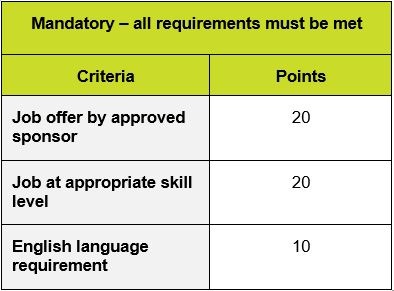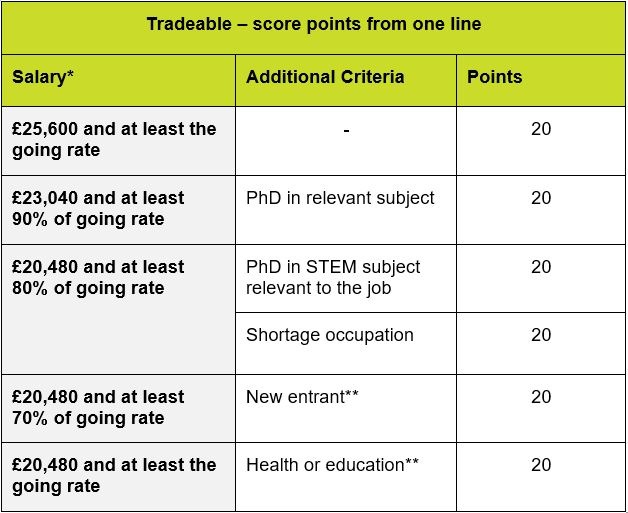We outline below answers to some frequently asked questions about the UK's new immigration system.
Frequently Asked Questions
Q1: What do employers need to know about the UK's new post-Brexit immigration system?
In order to bring new arrivals from the European Economic Area (EEA) after Brexit under the same visa regime as the rest of the world, UK Visas & Immigration (UKVI) launched its new Points-Based System for UK immigration on 1 December 2020.
So what options do employers have for bringing people to work in the UK under the new system?
Q2: Does everyone need a visa?
Certain nationalities can come to the UK as visitors without a visa but others need to obtain a visa in advance of arriving. People coming to the UK for short periods as visitors can undertake some permitted activities, such as attending meetings or conferences. Generally, visitors are not permitted to carry out productive work or provide services while in the UK, with some very specific exceptions (for instance, an employee of a foreign manufacturer may install, repair or advise on computer software purchased or leased by a UK company).
Q3: Do employers need to sponsor the visa?
Although some people will have other visa options available which allow them to work (see below), most migrants will need to be sponsored in order to apply for a work visa. The sponsor must be an organisation established in the UK which has been authorised by UKVI to sponsor migrant workers in the relevant category.
Those wishing to sponsor migrant workers who don't have a licence will need to apply for one. UKVI is currently processing new licence applications within about eight weeks (and more quickly where priority processing is granted). Employers should note that there is a significant compliance element to becoming a licensed sponsor.
Q4: What types of sponsorship are available to employers?
The sponsorship system covers a number of different visa categories.
- Skilled Worker
- Intra-Company Transfer
- T2 Minister of Religion
- T2 Sportsperson
- T5 Government Authorised Exchange
- T5 Charity Worker
- T5 Creative and Sporting
- T5 International Agreement
- T5 Religious Worker
- T5 Seasonal Worker
In order to sponsor a migrant worker within a specific category, an organisation needs to hold a licence for that category. Where categories have changed, licences held under the old categories automatically changed to the new ones in December 2020. Organisations can apply to add other tiers to an existing licence.
Most of these categories existed under the old Points-Based System and still operate in largely the same way. However there have been significant changes to the Skilled Worker category.
Q5: What has changed with the Skilled Worker category?
There are five major difference between the old Tier 2 (General) category and the new Skilled Worker category which has replaced it.
- The minimum skill level has been reduced – this means that a much wider range of roles are potentially suitable for sponsored migrants.
- The minimum salary has been reduced – this makes it easier for employers to sponsor migrants, although minimum thresholds and a "going rate" test still apply.
- The Resident Labour Market Test is no longer required – UKVI will still be interested in seeing how sponsors go about identifying and recruiting prospective employees but there are no longer specific requirements for how sponsors must advertise, making the process quicker and easier.
- The annual limit on visas has been suspended – employers hiring from outside the UK still need to approach UKVI on a case-by-case basis but the new process is easier and quicker.
- Cooling off periods and caps on total stay in the UK have been removed – this means employers are not barred from recruiting people who have recently worked in the UK.
All of the above changes are designed to make it easier and quicker for employers to sponsor visas in order to address the shortages expected to be caused by the end of free movement from the EEA and Switzerland.
However, there are still strict requirements to which employers will need to adhere in order to sponsor migrant workers.
Q6: What are the new minimum requirements for sponsoring a Skilled Worker?
Skilled Workers now need to score a minimum of 70 points in order to qualify for sponsorship. These are broken down into 50 mandatory points and 20 tradeable points.


*Salary no longer includes any allowances and must exceed the minimum threshold and relevant percentage of the going rate in the rules for the specific role.
**New entrants include those under 26, specific postdoctoral roles, those working towards recognised professional qualifications or chartered status and students who have recently completed (or are about to complete) certain UK courses of degree level or above.
***Only applicants in specified health and education roles can score points in the health and education category.
Sponsors should note that large parts of the Skilled Worker category continue to operate as before, including the need to comply with record keeping and reporting duties and the "genuine vacancy" requirement. The sponsor guidance was updated in December 2020 and sponsors should make sure that they are familiar with the current version.
Q7: Can those on other visas be employed without sponsoring them?
Those with permission in the following categories will not have conditions restricting who they can work for, unless otherwise indicated below.
- Indefinite leave to remain – (sometimes called "settled status" or "settlement").
- EU Settlement Scheme – EU, EEA and Swiss citizens (and their family members) who were resident in the UK before 11pm on 31 December 2020 may have, or be eligible for, status under this scheme. Please note that, in order to avoid discrimination, employers are not permitted to ask people to prove they have applied under the scheme until after 30 June 2021. (Though employers are protected provided they carry out a full right to work check before employment starts.)
- Tier 1 (Investor) – migrants who have invested at least £2 million in operating UK businesses.
- Start-up – migrants setting up their own business but while they get this up and running, they are allowed to work for other employers.
- UK Ancestry – Commonwealth citizens who have a grandparent born in the UK.
- Global Talent – established or upcoming world leaders in the fields of the science, engineering, humanities, medicine, digital technology, or the arts.
- Frontier Workers – EU, EEA and Swiss citizens who work in the UK but live elsewhere. Individuals must have worked in the UK before 11pm on 31 December 2020 and there are limitations on time inside/outside the UK.
- Service Providers from Switzerland - employees of Swiss-based companies may be able to come to the UK to deliver on a contract with a UK-based client where the contract existed before 11pm on 31 December 2020.
- ECAA Workers - Turkish citizens with this status are able to work but with restrictions depending on how long they have held the status. This category is now closed to new applicants and only available for extensions.
- Youth Mobility Scheme – for those below the age of 31 from certain countries to experience life and work in the UK.
- Dependants of Points-Based System migrants and workers – can work except as a doctor or dentist in training or as a professional sportsperson.
- Family members of British/settled people.
- Right of Abode – this is technically a status rather than a visa but should be evidenced in a passport by a visa vignette.
There is also an Innovator category for people establishing a business in the UK, but these migrants are only allowed to work for their own business – they cannot work directly for other employers in the UK. The same restriction applies to Turkish citizens with ECAA Business Person status.
Originally Published by GQ | Littler
The content of this article is intended to provide a general guide to the subject matter. Specialist advice should be sought about your specific circumstances.

